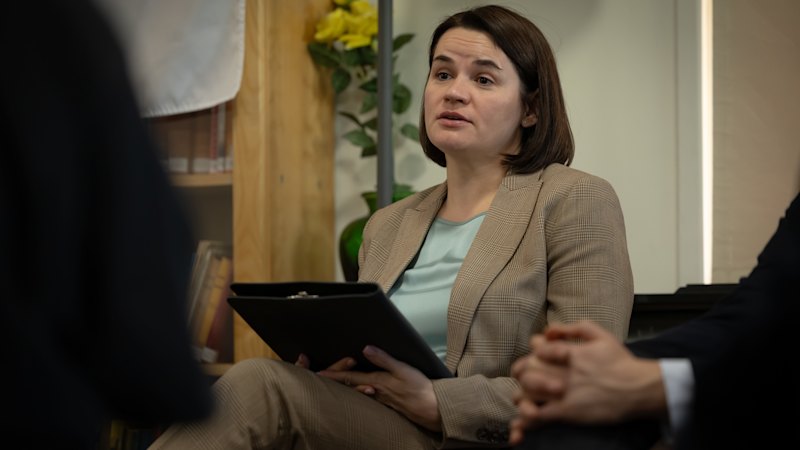
When Svetlana Tikhanovskaya meticulously planned her travel to Australia, she was acutely aware of the risks involved. As Belarus’ president-in-exile, she faced the possibility of extradition and imprisonment if she transited through certain countries. Consequently, the United Arab Emirates, Thailand, and India were not options. Tikhanovskaya, a vocal critic of Vladimir Putin, is considered a prime target by both the Russian president and Belarusian leader Alexander Lukashenko, who has held power since 1994.
During her visit to Sydney this week, Tikhanovskaya was accompanied by two bodyguards provided by the Australian government. This precaution was underscored by a speech from ASIO chief Mike Burgess, who warned of the real risk of assassination attempts on dissidents in Australia by at least three foreign governments, likely including Russia. Despite these threats, Tikhanovskaya remains undeterred, traveling the world to advocate for the liberty of her homeland, Belarus, from which she fled to seek refuge in Lithuania. She claims to have won the most votes in the 2020 Belarusian election, a victory overshadowed by Lukashenko’s alleged electoral manipulation.
The International Stage and Australia’s Role
The European Parliament recognizes Tikhanovskaya as Belarus’ president-elect, acknowledging her cabinet-in-exile as the legitimate representatives of the Belarusian people. According to The Economist’s democracy index, Belarus ranks as the 16th most authoritarian country globally, even less free than Russia.
“It’s a strategy of Russia to keep people stressed, intimidated, to keep people in fear,” Tikhanovskaya stated during an Uber ride to her next engagement. “Our power, our strength, is to overcome it.”
While in Australia, Tikhanovskaya’s schedule is filled with meetings with key political figures, including Foreign Minister Penny Wong and several former prime ministers. However, a meeting with Prime Minister Anthony Albanese remains elusive. Tikhanovskaya emphasizes the importance of Australia’s international voice, urging the nation to help bring Belarus out of the shadows and recognize its fight for democracy.
Geopolitical Implications and Strategic Concerns
Tikhanovskaya highlights Australia’s significant military support for Ukraine, urging Albanese to consider Belarus strategically. She notes that Putin’s ground assault on Kyiv in February 2022 was launched from Belarus, not Russia. Tikhanovskaya argues that Ukraine will remain vulnerable to Russian aggression as long as Lukashenko, viewed as a Putin puppet, retains power in Minsk.
A leaked 2023 document from Putin’s office outlines a plan for Russia to gain full control of Belarus by 2030 under the guise of a merger.
“We are facing the same enemy: the imperialistic ambitions of Russia,” Tikhanovskaya asserts. “Next it might be Lithuania, Poland. If we don’t show red lines to dictators, they will go further.”
The Accidental Candidate and Her Rise
Despite her current stature, Tikhanovskaya describes herself as an “accidental candidate” in the 2020 presidential race. Raised in southern Belarus near the Chernobyl exclusion zone, she spent summers in Ireland to escape radiation exposure. Her husband, Sergei Tikhanovsky, became a prominent critic of Lukashenko, leading to his imprisonment. Tikhanovskaya entered the presidential race as a symbolic act of love, not expecting her campaign to gain traction.
Her husband’s unexpected release in June, brokered by the Trump administration, suggests a strategic move by Lukashenko’s regime, possibly hoping to spark rivalry between the couple. However, Tikhanovskaya insists they complement each other’s efforts.
Calls for Stronger Sanctions and Support
Foreign Minister Penny Wong, who is scheduled to meet Tikhanovskaya, acknowledges the dire situation in Belarus, where thousands have been unjustly detained or forced into exile. The Australian government has sanctioned Lukashenko and his officials, imposing a 35% tariff on Belarusian imports. Tikhanovskaya advocates for more extensive sanctions and supports Lithuania’s bid to charge Lukashenko with crimes against humanity at the International Criminal Court.
She also proposes the creation of a parliamentary group for democratic Belarus, highlighting historical ties between Belarusians and Australians during World War I. Tikhanovskaya urges Australia to halt the import of Russian oil, which continues to enter the country through intermediaries like India.
Despite Lukashenko’s firm grip on power, Tikhanovskaya remains optimistic about witnessing a democratic Belarus in her lifetime. As she steps out of her Uber, the driver, having overheard the conversation, expresses gratitude for her efforts. Tikhanovskaya responds with determination, “Dictators are not immortal. They’re not almighty, and we just have to do everything possible to not make their lives easier.”







